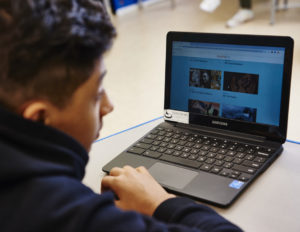Pedagogical approach
Educating middle schoolers is a critical endeavor with unique challenges and opportunities. Every Amplify ELA lesson is designed to help teachers establish a classroom where students thrive academically, socially, and emotionally, while developing the essential skills of reading, writing, speaking, and listening in order to form a literate community

1. Critical and collaborative engagement
Amplify ELA lessons foster a classroom community that thrives on a wide range of student observations. The lessons immerse students in interactive close reading activities and cognitively challenging work, and keep them engaged through a variety of collaborative, digital, and project-oriented learning opportunities.

2. Integrated approach/targeted objectives
Students explore the most compelling aspects of text passages with instruction that targets key standards. By integrating analytic reading practices, evidence-based writing, and academic discussion, students are able to harness and develop the power of their ideas.

3. Text at the center
Great texts spark curiosity, reveal layered meanings, reflect a diversity of perspectives and identities, and cultivate meaningful conversation and reflection. Amplify puts complex text at the center of every lesson and activity to develop the critical capacities and build the vocabulary, knowledge, and skills students need to succeed in middle school, high school, and beyond.

4. Multimodal and strategic technology
Activities harness multiple learning modes, using media tools, digital apps, and a variety of visual and physical experiences to strategically support and enhance student learning.

5. High expectations/strong supports
Distinct levels of differentiation mean that all students—struggling readers, students ready for advanced work, English language learners—can take on the challenge of rigorous work while data delivery and digital tools allow teachers to ensure progress.

6. Timely feedback and actionable data
Embedded formative assessment measures and targeted feedback tools mean teachers can make timely decisions about instructional strategy and provide the guidance students need to thrive as readers and writers.